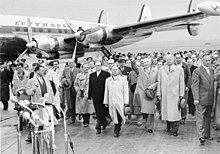Flag carrier
Flag carrier and national airline (German national airline ) is not uniformly defined term used in civil commercial aviation and refers to an airline under different possible conditions for third recognizable affinity has become a state.
With exceptions, the term flag carrier is used to designate air transport companies that are wholly or largely state-owned (or previously were). Accordingly, the state-owned company Etihad Airways , for example, describes itself as the national airline of the Emirate of Abu Dhabi or the state-owned Royal Jordanian as the national airline of Jordan .
Airline owned by a state

In the traditional sense, those airlines are called flag carriers, the majority of which are owned by a state. A monopoly position in the domestic market is also typical here . In some cases, such flag carriers also perform state tasks such as the transport of state officials on the occasion of state visits. Historically, the term was used in particular for state airlines in Europe such as Air France , British Airways or Deutsche Lufthansa . As a result of increasing privatization as well as liberalization in air traffic and open skies agreements , the term is increasingly changing in meaning, at least in Europe (see below).
Airline licensed by a state
In the United States , among others , flag carriers are used to designate all airlines that hold a license from the aviation authority of the relevant state. Other states also partially recognize purely private airlines as flag carriers. In 2010 , the Fly6ix was approved as the country's flag carrier in Sierra Leone , followed by the also private virtual airline Fly Salone .
marketing

Because of its historical prestige, the legally unprotected term flag carrier is also used by airlines that do not represent flag carriers in the conventional sense, but suggest an exclusive state reference within the scope of their marketing strategy. The airline Virgin Atlantic, for example, called itself “Britain's Flag Carrier” in response to the removal of the Union Jack from the tail units of British Airways aircraft .
Examples
-
 Qantas Airways
Qantas Airways
-
 Air France
Air France
-
 Royal Jordanian
Royal Jordanian
-
 Korean Air
Korean Air
-
 Malaysia Airlines
Malaysia Airlines
-
 Air Moldova
Air Moldova
-
 MIAT Mongolian Airlines
MIAT Mongolian Airlines
-
 TAP Air Portugal
TAP Air Portugal
-
 British Airways
British Airways
-
 Polskie line Lotnicze LOT
Polskie line Lotnicze LOT
-
 Lufthansa
Lufthansa
-
 Finnair
Finnair
-
 Aeroflot
Aeroflot
Individual evidence
- ^ Gordon Milles: The Airline Revolution: Economic analysis of airline performance and public policy . Routledge, New York 2017, ISBN 978-1-4724-3234-6
- ↑ Visit Abu Dhabi, Etihad Airways , accessed April 19, 2017
- ^ Oneworld, Royal Jordanian , accessed April 19, 2017
- ↑ School for Tourism: What is a flag carrier? ( Memento from February 26, 2010 in the Internet Archive )
- ↑ Pompl u. a .: To differentiate the business models in passenger air transport: The Full Service Network Carrier ( Memento from January 12, 2012 in the Internet Archive )
- ^ UCLA ( Memento of July 9, 2010 in the Internet Archive ) Air transportation by US flag carriers
- ↑ President Koroma Inaugurates Fly 6ix airline. Global Times Online, December 14, 2010. ( Memento from August 2, 2012 in the web archive archive.today )
